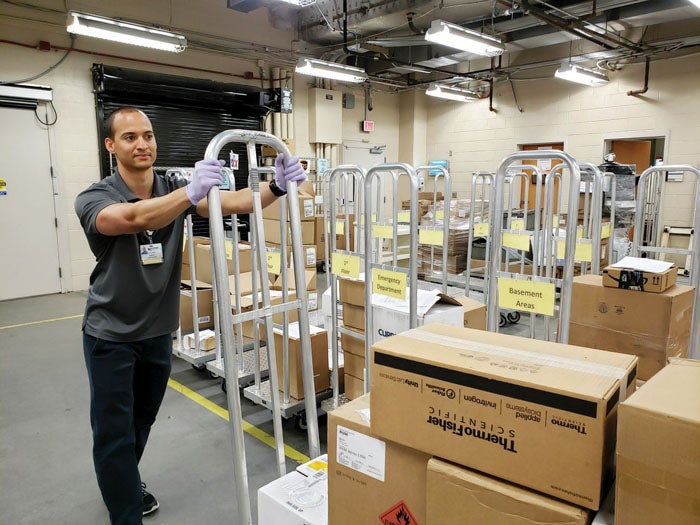But he’s not working with patients at the moment. The COVID-19 pandemic put that on hold. Eager to provide for his family, Fortune asked if he could float to another area within the health care system.
He landed in the supply chain department at Novant Health Forsyth Medical Center. And over the last two weeks, Fortune has developed a new respect for the “lifeblood force” of the hospital.
‘A bit naive’
Before the coronavirus, Fortune took great pride in his job as a clinical athletic trainer.
“Each day is different,” he said. “Regardless of whether you are helping someone reach a new personal record or helping a patient decrease their pain after chemotherapy, I find my work really fulfilling.”
Most of his patients come as referrals from hospital surgeries, and business was booming up until elective surgeries were suspended.
“I was a bit naïve at first as to how coronavirus would impact me personally,” he said. “But when the governor shut down fitness centers to help flatten the curve, I was out of work.”
Call of duty
Fortune and his fellow athletic trainers could see the writing on the wall.
“We knew that we might be out of our current jobs for quite some time,” he said. “So we asked where else we can serve.”
He did not have to wait long for an answer. “I was told on Tuesday (March 24) that my job was shutting down, but that I could report for work on Wednesday (March 25) in supply chain.”
And so it was a new adventure the following day when Fortune made his way to the basement level of Forsyth Medical Center. After receiving a crash course of on-the-job training, he and his fellow athletic trainers were deputized supply chain operatives.
300 deliveries a day pour in
Angie Henderson, the supply chain manager at Forsyth Medical Center, said their assistance came at just the right time.
On average, her team of 14 receives at least two full truckloads of medical supplies a day from the Novant Health Logistics Center. They also receive an additional 300 or more deliveries from the likes of FedEx and UPS. And in light of COVID-19, her team has been stretched even more to get supplies where they need to go.
“We recently added a third shift,” she said. “Our goal is to make sure that our team members have the personal protective equipment (PPE) that they need at all times.”
After the trucks arrive at the hospital, Henderson’s team lead by Curtis Collins, supply chain materials supervisor, unpacks each box, takes an electronic inventory and then counts by hand to make sure each unit gets the appropriate number of masks. Then like Santa’s crew on Christmas Eve, the team dashes to make deliveries. The only difference is they do it 365 days a year.
Fortune admits he never thought much about his colleagues on the supply chain team before this.
“I’ve learned that the supply chain serves as the lifeblood of the hospital,” he said. “And while I’m looking forward to going back to my day job, I have realized that I can only do that job, where I typically just order supplies and then they magically appear, because they do their jobs really well.”




